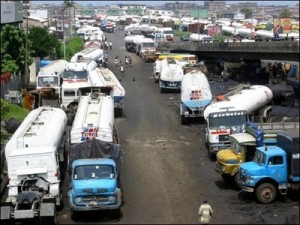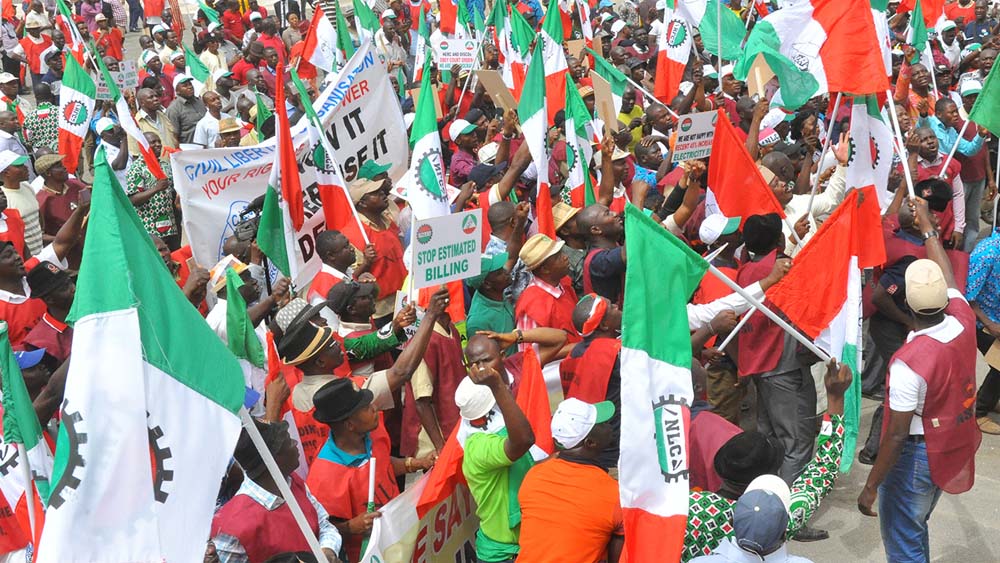Oil
FG vs Marketers: fuel scarcity in Nigeria to get worse as Petrol tanker drivers resume strike
By Yemie ADEOYE
LAGOS – The ongoing petrol scarcity in Nigeria is set to get worse as Petroleum Tanker Drivers arm of the Nigeria Union of Petroleum and Natural Gas Workers, on Monday suspended loading of petroleum products in the entire South West zone, including Ilorin in a seeming attempt to force the federal government to comply with the Oil marketers demand.
 The action is capable of worsening an already bad situation regarding the petrol supply situation especially as products for most parts of the country are usually loaded from the zone for delivery to other parts.
The action is capable of worsening an already bad situation regarding the petrol supply situation especially as products for most parts of the country are usually loaded from the zone for delivery to other parts.
Our correspondent gathered from sources in Apapa, Lagos that the suspension of product loading was indefinite.
“This is, indeed, a very challenging time for businesses in the downstream sub-sector of the petroleum industry. As we speak, there was no loading today (Monday) in the whole of the South West, including llorin,” one marketer, who did not want to be named, told our correspondent in a telephone interview.
“We don’t know when this action will be called off,” the source added.
Another marketer, who was willing to reveal the content of the message sent by the PTD, said the situation had got out of hand.
The message from the PTD group to NUPENG members read, “Comrades/unit chairmen/executives, you are directed to suspend all loading activities in all the depots as from Monday, 18th of May, 2015.
“There will be severe sanctions for any chairman/others that does not comply.”
Our correspondent learnt from industry sources that the tanker drivers were advised to take the action by the marketers, who were owed subsidy arrears running into over N200bn by the Federal Government.
There have been heightened fears among the marketers that they may not be paid the subsidy arrears if the current government does not take full responsibility to liquidate the debt.
Two weeks ago, the tankers were withdrawn from the roads by the National Association of Road Transport Owners in protest against the failure of the marketers to pay their transport claims for lifting products from the depots to filling stations across the country.
The Executive Secretary, Major Oil Marketers Association of Nigeria, Mr. Thomas Olawore, had hinged the inability of the marketers to pay the transporters on the settlement of the subsidy claims owed the marketers by the Federal Government.
Despite the payment of N154bn to the marketers, who in turn made a part payment to NARTO, the scarcity of petroleum products, especially petrol, has persisted, grounding economic and social activities in the country.
Olawore had earlier confirmed that the marketers paid NARTO from the N154bn subsidy claims paid to them by the Federal Government.
He said NARTO’s N20bn outstanding claims would be paid as soon as the government paid the outstanding N200bn subsidy claims.
Oil
NNPC Targets 60% Methane Emission Reduction By 2031
The Nigerian National Petroleum Company Limited (NNPC) has unveiled a bold strategy to reduce methane emissions in the oil and gas sector by 60% by 2031, with an ultimate goal of achieving net-zero emissions by 2060.
This announcement reinforces Nigeria’s leadership role under the Global Methane Pledge initiative and its commitment to tackling climate change.
The Group Chief Executive Officer of NNPC, Mele Kyari, disclosed these plans during a meeting on Thursday with Robert Leahman, the U.S. State Department’s Global Methane Program Manager, and a delegation from Deloitte.
READ MORE: Atiku Gloats Over AUN’s Achievements Ahead Of 20th Anniversary
The discussions, held at the NNPC Towers in Abuja, focused on collaborative efforts to reduce methane emissions through innovative and sustainable practices.
“Reducing methane emissions is not just an environmental necessity but also a strategic imperative for Nigeria’s energy transition. We are leveraging partnerships to adopt global best practices and innovative solutions,” Kyari stated.
Key among these efforts is a pilot project in the Niger Delta, aimed at establishing emissions baselines, mitigating methane leaks, and promoting sustainable operations across Nigeria’s energy sector.
The project, a partnership between NNPC, Deloitte, and the U.S. Bureau of Energy Resources, will utilize data-driven methodologies to pinpoint and address methane hotspots.
Robert Leahman commended Nigeria’s proactive stance, describing it as a benchmark for other nations on the continent.
“Nigeria’s leadership under the Global Methane Pledge sets a standard for the continent. These initiatives will not only help reduce emissions but also drive sustainable development in the energy sector,” he said.
Kyari highlighted the broader benefits of addressing methane emissions, noting its significance for both environmental protection and economic efficiency.
“This collaboration is a game-changer. By addressing methane leaks, we’re reducing waste, saving costs, and protecting the environment. It’s a win-win for our economy and the planet,” he added.
Oil
FG Introduces New Incentives To Revitalize Nigeria’s Oil & Gas Industry
In a strategic move to revitalize Nigeria’s oil and gas sector, the Federal Government has unveiled two key fiscal incentives aimed at attracting investment and enhancing energy security.
The announcement was made by Mr. Wale Edun, the Minister of Finance and Coordinating Minister of the Economy on Wednesday.
The first initiative, the Value Added Tax (VAT) Modification Order 2024, introduces critical exemptions for essential energy products and infrastructure, including Diesel, Feed Gas, Liquefied Petroleum Gas (LPG), Compressed Natural Gas (CNG), Electric Vehicles, Liquefied Natural Gas (LNG) infrastructure, and Clean Cooking Equipment.
Read Also: Atiku Calls For Rotational Presidency Across Nigeria’s Geopolitical Zones
These exemptions are designed to reduce living costs for Nigerians, promote energy security, and accelerate the transition to cleaner energy alternatives.
The second initiative, the Notice of Tax Incentives for Deep Offshore Oil & Gas Production, offers new tax relief options for deep offshore exploration projects.
This measure aims to position Nigeria’s deep offshore basin as a premier destination for international oil and gas investments, boosting the country’s appeal to foreign investors.
These reforms are part of a broader set of policy initiatives, known as Policy Directives 40-42, endorsed by President Bola Ahmed Tinubu.
The directives reflect the administration’s commitment to fostering sustainable development in the energy sector and enhancing Nigeria’s competitive edge in the global oil and gas market.
Business
Tinubu set to approve ExxonMobil-Seplat oil deal, expands CNG bus initiative

By Yemie Adeoye
NIGERIA’s President Bola Tinubu has announced that the protracted ExxonMobil-Seplat upstream oil divestment will be formally approved by the Minister of petroleum within a matter of days, just as he announced his government’s intention to expand the Compress natural Gas, CNG buses initiative.
The President who stated this during his Independence day nationwide broadcast stated that the move is in line with his administration’s commitment to free enterprise, free entry and free exit in investments which is the hallmark of his administration investment policy.
“Fellow compatriots, our administration is committed to free enterprise, free entry, and free exit in investments while maintaining the sanctity and efficacy of our regulatory processes. This principle guides the divestment transactions in our upstream petroleum sector, where we are committed to changing the fortune positively. As such, the ExxonMobil Seplat divestment will receive ministerial approval in a matter of days, having been concluded by the regulator, NUPRC, in line with the Petroleum Industry Act, PIA. This was done in the same manner as other qualified divestments approved in the sector.”
The President also seized the opportunity to plead with Nigerians to be patient with his administration’s reform policies. “As your President, I assure you that we are committed to finding sustainable solutions to alleviate the suffering of our citizens. Once again, I plead for your patience as the reforms we are implementing show positive signs, and we are beginning to see light at the end of the tunnel”.
“Our energy transition programme is on course. We are expanding the adoption of the Presidential Initiative on Compressed Natural Gas for mass transit with private sector players. The Federal Government is ready to assist the thirty-six States and FCT in acquiring CNG buses for cheaper public transportation.
Fellow Nigerians, while we are working to stabilise the economy and secure the country, we also seek to foster national unity and build social harmony and cohesion. Our economy can only thrive when there is peace”. he enthused.


















